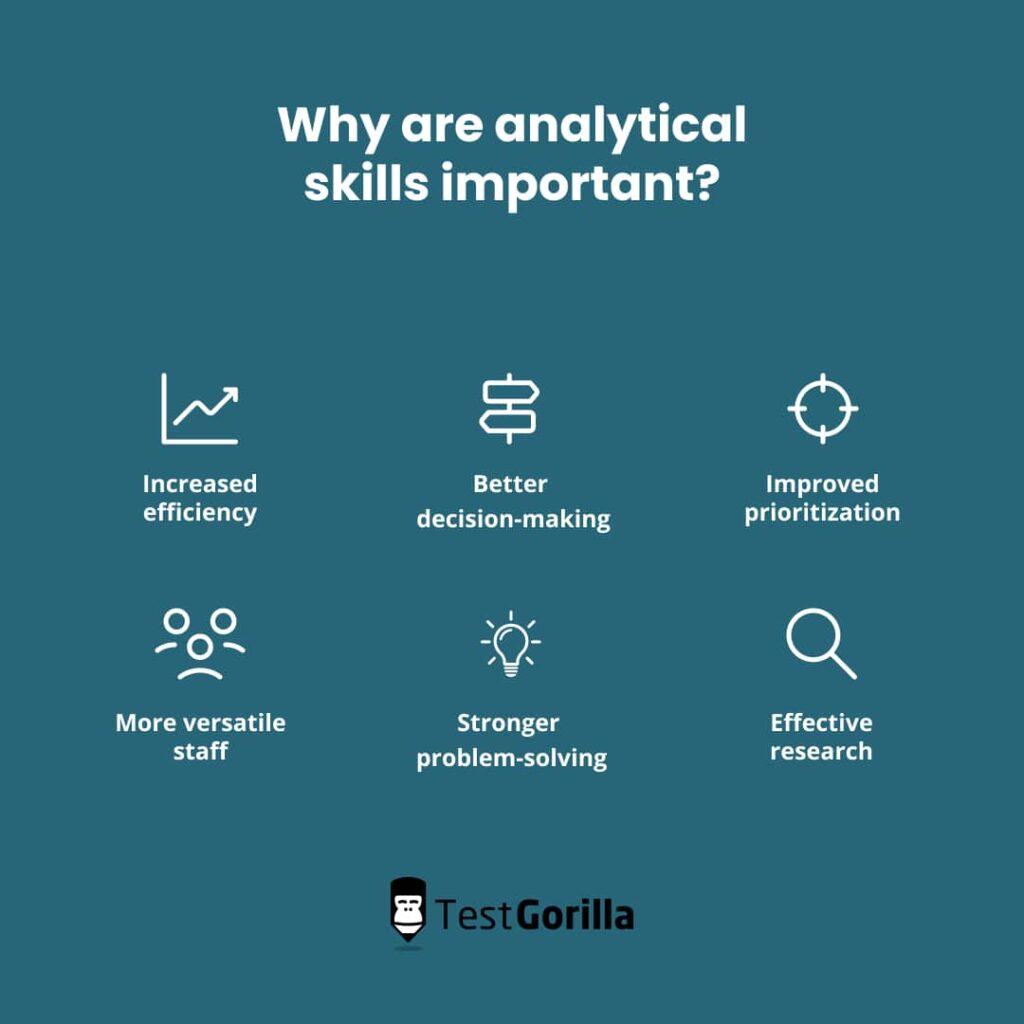Staff with a knack for analyzing things can bring a ton of benefits to your business. They’re excellent at making wise decisions and offering valuable insights into your figures and data.
But how do you know if someone has good analytical skills before you hire them?
TestGorilla, a leading pre-employment testing platform, helps you with this. It enables you to test your potential candidates’ analytical abilities in a straightforward, effective, and bias-free way.
Read on to learn what analytical skills are most important, why they matter, and how you can use TestGorilla to find employees who have them.
Table of contents
What is an analytical skills assessment?
An analytical skills assessment evaluates a candidate’s ability to analyze data, information, and situations.
It typically asks test-takers to answer questions or complete a series of tasks that will evaluate their skills in logical thinking and reasoning, quantitative analysis, critical thinking, data analysis, and decision-making.
You can see if someone can effectively analyze arguments, break down problems, work with numbers and interpret results, spot patterns in information, gather insights from data, and make intelligent, fact-based decisions.
This assessment is typically used before employment, and we recommend you perform it even before you sift through candidates’ resumes.
Why are analytical skills important?
Increased efficiency
Your staff works smarter when they’re able to analyze things well. They’ll understand what’s most important for your business and focus their energy there. They’re all about cutting out unnecessary work and zeroing in on what brings value. In doing so, they can offer your business more potential for profit.
Better decision-making
When your staff has strong analytical skills, they make better decisions. They won’t just guess or go with their gut – they’ll base their decisions on facts and data.
Analytical employees will identify problems, gather relevant information, develop logical solutions, and make clear, data-driven decisions.
Improved prioritization
In a busy workplace, there are always a million things to do. Prioritizing what to do first can be a real headache. But not for someone with strong analytical skills.
They can weigh up multiple tasks objectively and focus on what’s most important, leaving lower-priority action items to complete later. This ensures urgent work always gets done first.
Ultimately, the better your staff prioritizes, the smoother your operations will run.
More versatile staff
Analytical skills aren’t just about crunching numbers or solving complex puzzles. They’re transferable skills that can be applied to a wide range of roles. Staff with these skills can handle different tasks, from resolving customer complaints to managing projects. They can quickly adapt to changing circumstances and wear different hats.
This versatility is an enormous advantage. It means your business can be more adaptable and adjust quickly when circumstances change.
Stronger problem-solving
Employees with solid analytical skills are great at problem-solving. They don’t panic when things go wrong. Instead, they stay calm, analyze the problem objectively, and devise a plan to fix it.
They’re able to make concrete decisions effectively and take swift action to resolve issues. This means less time spent stuck in a rut and more time moving forward.
Effective research
Doing research is, of course, about collecting information. But it’s also about asking the right questions, knowing where to look, and figuring out what the data is telling you.
People with strong analytical skills are great at this. They can define a problem, make a plan, collect the correct data, and then analyze it. Analytical people don’t take things at face value. They dig deeper, draw conclusions, and use their findings to make better decisions.
This leads to more effective research and more informed decisions for your business.
What skills and traits are important for analytical people?
Analytical people aren’t all the same, but they often have a number of things in common. They usually have most or all of the following skills:
Logical thinking and reasoning
Analytical people don’t go with their gut or let their emotions lead the way. They practice logical thinking and reasoning to decide what to do. They see the connection between different bits of information, carefully evaluate evidence, and rely on logic and reason to come up with logical conclusions.
Analytical people are also good at spotting trends, seeing patterns, and making predictions based on facts. This means they can see the bigger picture and understand how different parts of a problem relate to each other.
Attention to detail
Attention to detail is another key trait of analytical people. They’re like detectives, always looking for clues and ensuring they leave no stone unturned.
You won’t find an analytical person merely skimming through information. They dig deep and pay attention to the small things others might miss. They spot inconsistencies and errors that could lead to problems down the line.
This means they’re able to produce high-quality work and avoid mistakes. And in business, avoiding mistakes can save you a lot of time and money.
Curiosity
Analytical people are naturally curious. They have an innate desire to understand how things work and why things happen. This curiosity fuels their pursuit of knowledge and drives them to dig deeper into problems and challenges.
Their curiosity prompts them to ask probing questions and stop only once they get clear answers. They aren’t content with superficial information – they want to get to the heart of the matter.
Problem-solving skills
Analytical individuals excel in problem-solving. They’re skilled in breaking down complex issues into manageable parts and identifying the root cause of problems. This allows them to devise practical solutions rather than simply addressing symptoms.
They leverage their logical reasoning skills, creativity, and systematic approach to information to find the best way to tackle a problem. They’re adept at understanding the intricate web of cause and effect, predicting potential outcomes, and formulating plans to overcome obstacles, which makes them invaluable in a business setting.
Perfectionism
A degree of perfectionism is often a trait in analytically minded people. This shouldn’t be confused with an unattainable pursuit of perfection. Rather, it represents a dedication to excellence.
Analytical people aim for accuracy and precision in their work, meticulously checking and rechecking their processes and outputs. They strive for the highest standards because they understand the ripple effect of errors and are driven to produce quality results.
This perfectionism, tempered by realism and practicality, can elevate your organization’s overall quality of work.
Independence
Analytical people are usually independent thinkers. They’re comfortable working autonomously and prefer forming conclusions based on evidence and logical reasoning. They aren’t easily swayed by popular opinion or groupthink. Instead, they critically evaluate information and use their judgment to arrive at decisions.
This independence can foster innovation and resilience, allowing them to challenge existing assumptions, introduce fresh perspectives, and navigate through challenges with a straightforward, logical approach.
Organization
Organization is another key trait of analytical people. They know how to prioritize tasks, manage their time effectively, and keep track of data and information. Their orderly minds favor structured environments and systematic procedures.
This trait lends itself well to project management, data analysis, research, and any situation where orderliness is paramount.
An organized, analytical mind can bring a level of efficiency and precision to your organization, helping streamline operations and improve productivity.
Top interview questions for testing analytical skills
The right questions in an interview can accurately evaluate a candidate’s analytical skills. They can reveal a candidate’s skills in problem-solving, decision-making, data analysis, adaptability, and more.
Tailoring your questions to the specific industry you’re testing for is important. Each field requires a unique set of analytical skills.
To help get you started, we’ve outlined five questions to ask and provided versions of each tailored to specific job roles.
1. Can you describe a time when you had to solve a problem with limited information? How did you approach the situation?
This two-in-one question evaluates a candidate’s capability to think critically and make decisions with limited information. It measures their problem-solving skills and their capacity to deal with ambiguity.
As mentioned, you can make more specific versions of these questions for your hiring role. For example, for a financial analyst this question could be:
Can you share an experience where you had to analyze financial data and make recommendations despite having limited access to relevant information?
2. What methods do you use to track metrics in your job?
This question evaluates the candidate’s ability to establish and implement effective measurement systems. They can show their understanding of performance tracking and their ability to create relevant metrics.
You could ask someone applying for a digital marketer position:
How do you measure the success of your digital marketing campaigns? Can you provide an example of a critical metric in assessing campaign performance?
3. How do you ensure your metrics are accurate?
You can use this question to evaluate a candidate’s attention to detail and commitment to data accuracy. It assesses their ability to validate and verify information, as well as their understanding of potential sources of errors or biases.
For a supply chain manager position, you could ask:
How do you ensure the accuracy of inventory data across multiple locations and systems?
4. When faced with a decision between two or three options, what criteria do you use to make your choice?
Here, you’re assessing a candidate’s decision-making process and ability to evaluate multiple options objectively. Their response shows their ability to think analytically and prioritize criteria based on the context of the decision.
For a project manager, consider a question like:
What factors would you consider when deciding which tasks to prioritize?
5. Could you show an example of a project or situation where you exercised your analytical skills productively?
This question is broad. It gives candidates some room to showcase a practical application of their analytical skills. They can use it to demonstrate their ability to identify problems, analyze data, and propose practical solutions.
You could use this question for a data scientist candidate:
Could you tell me about a project where you used advanced analytics to uncover valuable insights and make significant improvements?
Skills and traits tests for analytical skills
With a library of more than 300+ tests, TestGorilla makes it easy to accurately evaluate your prospective hires’ skills and aptitudes. There are a number of tests perfect for evaluating analytical skills, including:
Attention to Detail tests
TestGorilla’s two Attention to Detail tests assess an individual’s ability to identify details and errors that might otherwise be overlooked.
For a textual examination, consider the Attention to Detail test (textual). This test focuses on a candidate’s ability to spot written text inconsistencies, errors, or discrepancies.
In contrast, the Attention to Detail test (visual) is great for a more visual examination. It evaluates an individual’s ability to spot visual inconsistencies or errors.
Both tests provide valuable insight into an individual’s analytical abilities, focusing specifically on their attention to detail.
Critical Thinking test
TestGorilla’s Critical Thinking test is a great tool to assess an applicant’s critical thinking skills. It measures their ability to think logically and make sound decisions based on information provided. It evaluates how a candidate can weigh evidence, understand implications, and deduce conclusions.
Candidates who excel in this test will bring informed decision-making and a rational perspective to your team – skills invaluable in every business setting.
Problem Solving test
Our Problem Solving test gauges a candidate’s ability to tackle complex challenges and devise effective solutions. It tests their ability to break down issues, identify their roots, and systematically find optimal solutions.
Verbal Reasoning test
TestGorilla’s Verbal Reasoning test examines a candidate’s ability to comprehend and interpret written information. This test provides insight into a candidate’s capability to understand, evaluate, and reason using language.
Top performers will do well in positions where strong communication, understanding text, and making logical conclusions based on verbal information are required.
Numerical Reasoning test
Numerical data is a crucial component of business analytics. Candidates with strong numerical reasoning skills can contribute significantly to roles that involve data analysis, financial management, and other quantitative tasks.
TestGorilla offers a Numerical Reasoning test to assess a candidate’s proficiency with numbers. It measures their ability to interpret, analyze, and draw logical conclusions based on numerical data.
TestGorilla can help you find staff with analytical skills
Analytical skills are highly important in today’s dynamic business environment. Employees with these skills can adapt to various roles and solve problems efficiently. They can also conduct effective research and contribute to your business’s long-term growth and success.
TestGorilla’s suite of tests enables you to effectively assess these skills in your potential hires. You can use assessment results and insights to shape your hiring decisions, ensuring you recruit a team capable of driving your business forward.
Sign up for a free plan to start incorporating TestGorilla into your recruitment process today.
Related posts
Hire the best candidates with TestGorilla
Create pre-employment assessments in minutes to screen candidates, save time, and hire the best talent.
Latest posts
The best advice in pre-employment testing, in your inbox.
No spam. Unsubscribe at any time.

Hire the best. No bias. No stress.
Our screening tests identify the best candidates and make your hiring decisions faster, easier, and bias-free.
Free resources
This checklist covers key features you should look for when choosing a skills testing platform
This resource will help you develop an onboarding checklist for new hires.
How to assess your candidates' attention to detail.
Learn how to get human resources certified through HRCI or SHRM.
Learn how you can improve the level of talent at your company.
Learn how CapitalT reduced hiring bias with online skills assessments.
Learn how to make the resume process more efficient and more effective.
Improve your hiring strategy with these 7 critical recruitment metrics.
Learn how Sukhi decreased time spent reviewing resumes by 83%!
Hire more efficiently with these hacks that 99% of recruiters aren't using.
Make a business case for diversity and inclusion initiatives with this data.


















